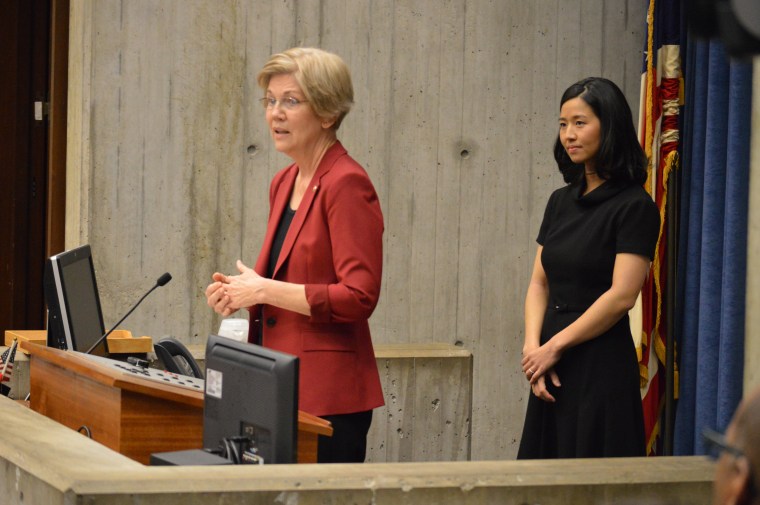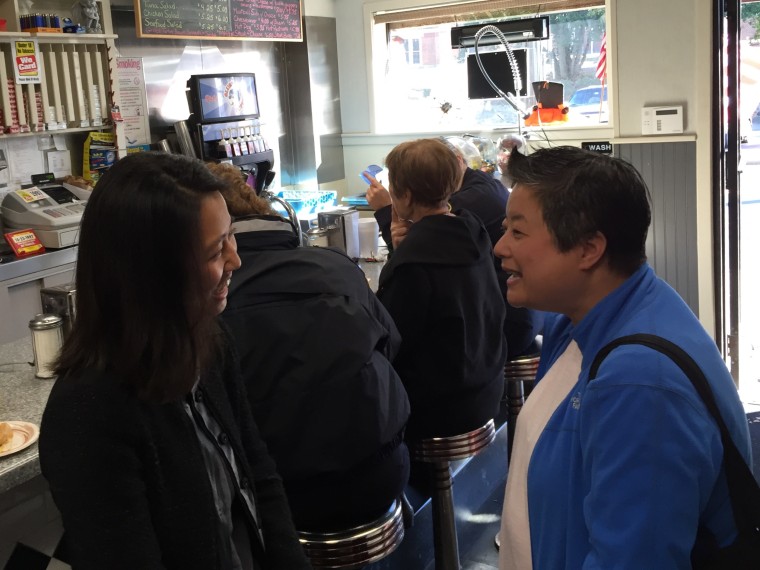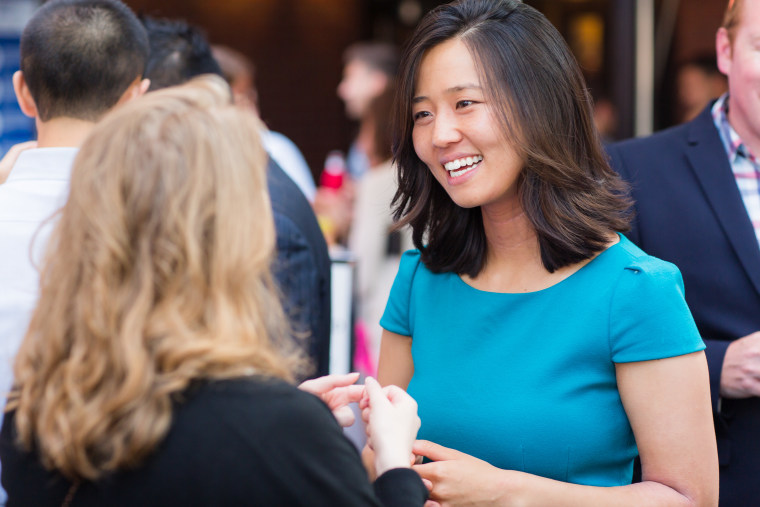Growing up in the suburbs of Chicago, Michelle Wu never thought about running for office.
Her parents, Taiwanese immigrants, stressed the value of stable, high-paying jobs. Adults in her mostly-white community suggested she take up figure skating, based on the success of Michelle Kwan.
“People told me all the time that I should think about one day becoming a figure skater when I grew up, because Michelle Kwan was so famous then,” Wu, the 31-year-old president of the Boston City Council, told NBC News, laughing. “She was the only sort of example of mainstream success as an Asian American.”
RELATED: On the Rise: Local Democratic AAPI Candidates to Watch in 2016
While public service was not Wu’s first plan, her career has flourished since she jumped into the Massachusetts political arena in 2012.
In January, just two years after being elected to the council, Wu’s peers selected her as president, making her the first Asian American and first woman of color to hold the seat.
A former student and campaign aide of Massachusetts Sen. Elizabeth Warren, Wu has political insiders raving about her potential. Many call her a unifying force between those with an “old-school” mentality and those representing a progressive “New Boston.”
Wu's main goal in office is making government more accessible for all Bostonians, particularly those in need, a mission informed by her family's own struggles.
Wu had just graduated from Harvard University and was working as an associate at Boston Consulting Group when she received a phone call in 2008. Her two younger sisters told her something was “very wrong” with their mother.
“It was very sudden when I got that call from home,” Wu said. While she had noticed signs of her mother struggling before, the situation had worsened. “I had to go home [to Illinois] immediately.”
Her mother was in the midst of a nervous breakdown due to a serious mental illness. It became apparent the condition would require long-term help.
“It got really bad,” Wu said. “It just felt like things were spiraling out of control.”
"Some people in Boston are doing very well; we see a growing tech sector and a lot of economic opportunity in our city, but those who have the least have not been part of that economic growth."
Around that time, Wu’s parents separated. With her father working overseas, Wu became the family’s primary caregiver, taking care of her mother and two sisters, 16 and 10 at the time.
She decided to open a family business in Chicago. Her mother, who had taught Chinese classes for local children, often dreamed aloud about retiring from being a stay-at-home mother and opening up a teashop.
Wu laid the groundwork to open the business on a residential street on Chicago’s North Side, thinking her mother would eventually take over operations. Meanwhile, she also dealt with her mother’s health insurance and searched for a Mandarin-speaking health provider who understood the “cultural context” surrounding the illness.
“It always felt like there was one thing after another that we needed to do,” she said. “It was always…red tape and more hoops to jump through.”
Navigating the permitting and inspection processes for the teashop left Wu feeling helpless.
“What seemed like a minor piece to finishing — getting the piece of paper that allowed us to open — ended up taking more time than everything else, even though it should have been a very straight-forward process,” she said.
RELATED: Michelle Wu Becomes First Asian-American President of Boston City Council
While Wu enjoyed running the shop, she realized that her mother would be unable to take over operations. With the future in mind, she moved back to Boston in 2009 for law school, taking her mother and youngest sister with her.
“I will always remember what that [time in Chicago] was like,” she said. “The feeling of being utterly helpless and government not providing services or helping but even worse, putting up barriers to what my family wanted to do and needed to get done.”
In Boston, Wu focused on helping families and those trying to open small businesses. When she interned for the late former Boston Mayor Thomas Menino during her first year of law school, she set out to fix the city’s antiquated restaurant permitting system. After learning the system by visiting one city department after another, she created a guide to the process and made sure the paperwork could be accessed online.
“It got really bad. It just felt like things were spiraling out of control.”
She also spearheaded a change of the city’s mobile vending rules, paving the way for food trucks to operate.
Wu worked directly with struggling communities as well, providing legal advice to low-income, small business owners, and survivors of domestic violence, she said.
Leverett Wing, a political organizer active in Boston's Asian-American community, took note of Wu’s tireless work.
“I could see her just making these contacts and anytime I’d run into folks who were in the community…they all started raving about her,” Wing, now close friends with Wu, told NBC News. “And I’m thinking, ‘Wow…she could run for office if she wanted to. And she would be doing it for the right reasons.’”
Hitting the Trail
Over the course of some five months in 2012, Wu caused her friends’ jaws to drop with her extreme multitasking.
By spring of that year, she was a key cog on Warren’s Senate campaign. During that time she also graduated law school, passed the bar exam, and planned her wedding to now-husband Conor Pewarski.
As Warren’s constituency director, Wu oversaw outreach to various communities, including the LGBT community, communities of color, veterans, and women. Managing a team of coordinators, she made sure their concerns were addressed and that each community was supported in get-out-the-vote efforts.
Soon after Warren defeated incumbent Scott Brown, Wu, then 28, announced her bid for Boston City Council. The best way to help families, she decided, was to affect change at the city level.
While her work on the Warren campaign had raised her profile among progressives, it was shoe leather politics — literally — that won her the seat. Wu wore through three pairs of black heels as she kept up a whirlwind schedule that saw her shuttling from door-to-door canvasing to parades to house parties to fundraisers.
The work paid off: In November 2013, Wu finished second among eight candidates vying for four at-large seats, becoming the council’s second-ever woman of color following Ayanna Pressley, who was first elected in 2009.

Warren, who taught Wu contracts law at Harvard Law School, remains one of her former pupil’s most prominent supporters.
“From her time as my student to her work on our Senate campaign and now as City Council President, I’ve seen how committed Michelle is to making real change,” Sen. Warren told NBC News in a statement. “She doesn't fool around. She is a person with a good heart who gets out and does the hard work that needs to be done, and I’m proud of her.”
But there would be no honeymoon period for the new councilor.
Controversy erupted in the weeks leading up to inauguration day, when the councilors would hold their first vote, selecting one of their peers as president.
Word had gotten out that Wu would be voting for Bill Linehan, a South Boston Democrat with a reputation for being the city’s most conservative councilor.
The move shocked many of Wu’s progressive supporters, who believed Linehan symbolized regressive elements of Boston politics. Through social media, many pointedly questioned Wu’s commitment to progressive policies.
“I wasn’t even sworn in yet and I had hundreds of phone calls to return from people who were extremely angry, upset, and hurt,” Wu said. “There were supporters of mine, people who I deeply respected, publically saying in the media that they were never going to support me again.”
Her criteria for voting for Linehan, she said, was less about policy positions than who would most effectively run the council. Linehan, Wu said, pledged to decentralize power from the president’s office, empower committee chairs, and reorganize the council’s central staff — changes she believed would make the body run more smoothly.
“I had made a very careful and deliberate decision and given a commitment [to Linehan],” she said. “It is important for me to be the same person in politics and out of politics as someone who thinks about the facts and makes careful decisions.”
“This was a high-profile, very personal issue to a lot of people,” Wing said. “People expected her to vote a certain way and when it didn’t go their way ... they just reacted off the charts.”

After the vote, Wu reached out to her constituents to address the controversy.
Anne Rousseau, a local activist and co-chair of the community group Jamaica Plains Progressives, was one supporter who vocally questioned Wu. The group issued a strongly worded email blast to convince Wu to change her vote. Today, Rousseau credits Wu with reaching out to her and to the group to explain the decision.
“She stayed committed to keeping the connection. I really appreciated that,” Rousseau told NBC News. “I support her 100 percent now."
Bridging Role
In office, Wu pushed on with her council work. Her achievements included a successful push in 2014 for an ordinance that guarantees for transgender city employees access to gender reassignment surgery, hormone therapy, and mental health services. In 2015, she was the lead sponsor for an ordinance that provides six weeks of paid parental leave for city employees in the case of childbirth, stillbirth, or adoption. The ordinance came five months after Wu gave birth to her son, Blaise.
That year, she also led a push for a bring-your-own-bottle policy at Boston area restaurants with 30 or fewer seats, which aims to help restaurant owners who cannot afford a liquor license.
Wu advocated for government transparency, publishing council notes outlining public hearings, and legislative results on her Facebook page. She also pushed to require the city to make its data available online.
In November, Wu comfortably won reelection.
She said she decided to run for president of the council to continue to push for transparency and accessibility of government. When it became clear she had the necessary votes to win, other contenders dropped their campaigns in a bid to unify the body.
Wu’s victory, Wing said, showed she is able to work with the entire council regardless of politics.
“She is progressive,” he said. “She can say, ‘Look, I have done this. Let’s work with so-and-so on this.’ In spite of all the hits she took, she can be that bridge.”
The council president says she will use the office to look at leveling the playing field for Bostonians.
“Some people in Boston are doing very well; we see a growing tech sector and a lot of economic opportunity in our city,” Wu said. “But those who have the least have not been part of that economic growth.”
While Wu lacked Asian-American role models in politics when she was young, the story is different for young people today.
Wing, who occasionally works with youth on civic engagement efforts, said young Asian Americans benefit from seeing Wu in office. “When they meet Michelle, they are giddy,” he said.
“The best part is that she cares about the community. A lot of folks who might achieve this stature would be happy to get the stature and pay lip service to the community…but she genuinely cares,” he continued.
Today, Wu says her mother, who lives with her, is doing “much better.” Life for her family, now rooted in Boston, has stabilized.
But for Wu, her family's struggles continue to serve as motivation.
“It’s very important for me to make sure that those families that don’t have a voice and are struggling have access to help, to services, to a system that understands that people’s lives are complicated,” she said.
Follow NBC Asian America on Facebook, Twitter, Instagram, and Tumblr.
